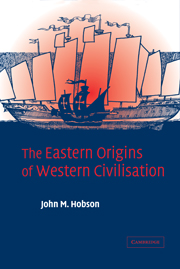Book contents
- Frontmatter
- Contents
- List of tables
- Preface and acknowledgements
- Map: Hobo-Dyer projection of the world
- 1 Countering the Eurocentric myth of the pristine West: discovering the oriental West
- I The East as an early developer: the East discovers and leads the world through oriental globalisation, 500–1800
- II The West was last: oriental globalisation and the invention of Christendom, 500–1498
- III The West as a late developer and the advantages of backwardness: oriental globalisation and the reconstruction of Western Europe as the advanced West, 1492–1850
- IV Conclusion: the oriental West versus the Eurocentric myth of the West
- 12 The twin myths of the rational Western liberal-democratic state and the great divide between East and West, 1500–1900
- 13 The rise of the oriental West: identity/agency, global structure and contingency
- Notes
- Index
13 - The rise of the oriental West: identity/agency, global structure and contingency
Published online by Cambridge University Press: 22 September 2009
- Frontmatter
- Contents
- List of tables
- Preface and acknowledgements
- Map: Hobo-Dyer projection of the world
- 1 Countering the Eurocentric myth of the pristine West: discovering the oriental West
- I The East as an early developer: the East discovers and leads the world through oriental globalisation, 500–1800
- II The West was last: oriental globalisation and the invention of Christendom, 500–1498
- III The West as a late developer and the advantages of backwardness: oriental globalisation and the reconstruction of Western Europe as the advanced West, 1492–1850
- IV Conclusion: the oriental West versus the Eurocentric myth of the West
- 12 The twin myths of the rational Western liberal-democratic state and the great divide between East and West, 1500–1900
- 13 The rise of the oriental West: identity/agency, global structure and contingency
- Notes
- Index
Summary
If I am right in urging the overthrow of [Eurocentrism] and its replacement by [anti-Eurocentrism], it will be necessary not only to rethink the fundamental bases of ‘Western civilization’ but also to recognize the penetration of racism and ‘continental chauvinism’ into all our historiography, or philosophy of writing history.
Martin BernalHistory is marked by alternating movements across the imaginary line that separates East from West Eurasia.
HerodotusThe globalization of knowledge and Western culture constantly reaffirms the West's view of itself as the centre of legitimate knowledge, the arbiter of what counts as knowledge and the source of ‘civilized’ knowledge. This form of global knowledge is generally referred to as ‘universal’ knowledge, available to all and not really ‘owned’ by anyone, that is, until non-Western scholars make claims to it. When claims like that are made history is revised (again) so that the story of civilization remains the story of the West. For this purpose, the Mediterranean world, the basin of Arabic culture and the lands east of Constantinople are conveniently appropriated as part of the story of Western civilization, Western philosophy and Western knowledge.
Linda Tuhiwai SmithWe concluded the last chapter by noting that the very features that were supposed to promote the rise of the West according to Eurocentrism – rationality and democracy – were absent in Europe during the period of its breakthrough between 1500 and 1900. Accordingly, we need to develop an alternative anti-Eurocentric theoretical explanation. This chapter undertakes this in four stages.
- Type
- Chapter
- Information
- The Eastern Origins of Western Civilisation , pp. 294 - 322Publisher: Cambridge University PressPrint publication year: 2004



